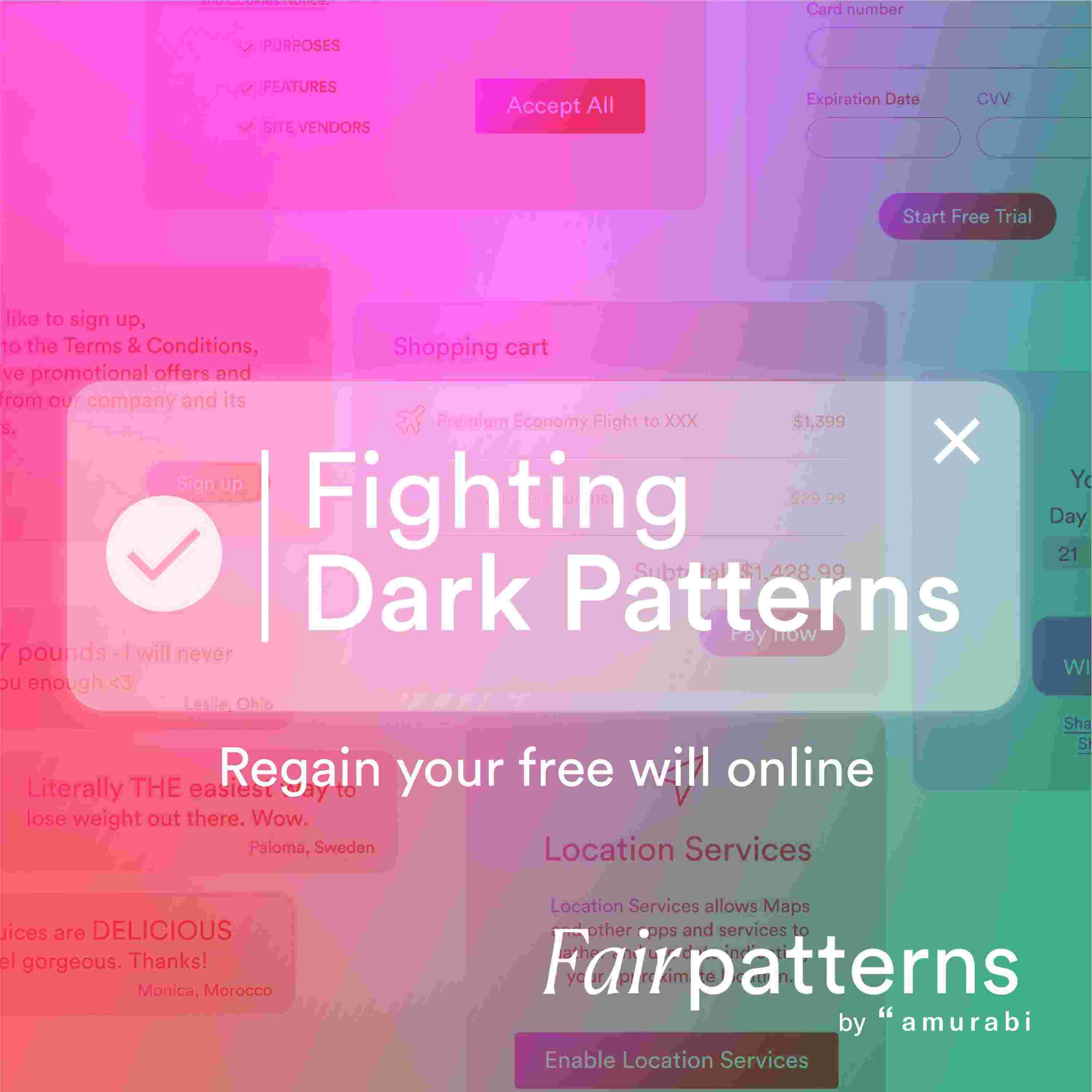
Have you ever struggled to resist sites or apps which prompt you to share ever more personal data? Who hasn’t casually clicked on the big green “I agree” button, instead of the little grey links below? And who doesn’t lose their patience unsubscribing from a website, when all it took was one click to “try for free”?
These features are called “dark patterns” or “deceptive patterns”, which are interfaces that deceive or manipulate users to make them act without realizing or against their own interests.
Why should we care about it ? Because …
✅ dark patterns harm the autonomy, the welfare and the privacy of individuals, and are psychologically detrimental
✅ a number of laws already prohibit dark patterns, and the global legislative framework is shifting towards clarity, transparency, accessibility and fairness by design
✅ dark patterns affect competition and trust in brands, and even puts our democratic models at risk
And because eventually, there is nothing sustainable about tricking users.
Dark patterns are pretty much everywhere online and yet, it’s not inevitable to be deceived or manipulated. With this podcast, once a month, Marie Potel, founder of the legal design agency Amurabi and of the platform fairpattern.com explore with her guests all the aspects of this dark and broad matter : regulation, ethics, marketing, user experience and much more.
A question or a need for support ? Go on fairpatterns.com or contact Marie Potel on LinkedIn !
This podcast is proposed and presented by Marie Potel, produced by Amicus Radio and directed by Leobardo Arango.
Original Music : Alexis Mallet.
Hébergé par Acast. Visitez acast.com/privacy pour plus d'informations.
Have you ever struggled to resist sites or apps which prompt you to share ever more personal data? Who hasn’t casually clicked on the big green “I agree” button, instead of the little grey links below? And who doesn’t lose their patience unsubscribing from a website, when all it took was one click to “try for free”?
These features are called “dark patterns” or “deceptive patterns”, which are interfaces that deceive or manipulate users to make them act without realizing or against their own interests.
Why should we care about it ? Because …
✅ dark patterns harm the autonomy, the welfare and the privacy of individuals, and are psychologically detrimental
✅ a number of laws already prohibit dark patterns, and the global legislative framework is shifting towards clarity, transparency, accessibility and fairness by design
✅ dark patterns affect competition and trust in brands, and even puts our democratic models at risk
And because eventually, there is nothing sustainable about tricking users.
Dark patterns are pretty much everywhere online and yet, it’s not inevitable to be deceived or manipulated. With this podcast, once a month, Marie Potel, founder of the legal design agency Amurabi and of the platform fairpattern.com explore with her guests all the aspects of this dark and broad matter : regulation, ethics, marketing, user experience and much more.
A question or a need for support ? Go on fairpatterns.com or contact Marie Potel on LinkedIn !
This podcast is proposed and presented by Marie Potel, produced by Amicus Radio and directed by Leobardo Arango.
Original Music : Alexis Mallet.
Hébergé par Acast. Visitez acast.com/privacy pour plus d'informations.

Some people might consider that marketing is some form of manipulation, making it almost impossible for a marketer to do their job without tricking users in one way or another.
But in reality, marketers are asked to build experiences that drive trust, conversion, and long-term customer relationships. How can marketers benefit from fighting dark patterns in their daily job, and what do they have to keep in mind to gain user trust? These are the topics discussed in today’s episode with Marie Potel and her guest Raashee Gupta Erry, senior expert in marketing advertising and consumer privacy.
🎧 You heard:
💡 To go further:
Have a question or need some support? Go to fairpatterns.com or contact Marie Potel on LinkedIn!
Hébergé par Acast. Visitez acast.com/privacy pour plus d'informations.